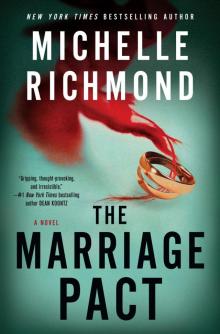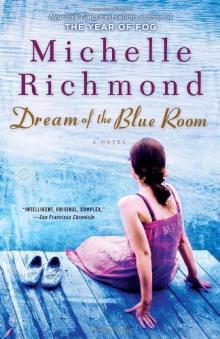- Home
- Michelle Richmond
The Wonder Test Page 2
The Wonder Test Read online
Page 2
“It’s apparently the gold standard of standardized tests. It happens in the spring of tenth grade, and every public school in Silicon Valley is obsessed with it. The kids have been preparing since day one of freshman year. According to our assemblies, which are more like pep rallies, the test is crucial to the teachers, the principal, the parents, the whole town.”
I take a sip of my Modelo. “What about the kids?”
“I’m not sure anyone asked them.” He reaches into his backpack and pulls out a thick yellow booklet, which he slides across the table. Wonder Test Prep is printed in red on the cover. “We have to do one question per section each day at home, and we spend the first half of each school day analyzing our answers.”
I flip to the table of contents:
Part 1: Analogies
Part 2: Ethicalities
Part 3: Diagrams and Analyses
Part 4: Theories of Global Patterns
Part 5: Future Functionalities
I turn the page and skim the introduction. “According to research published in 2012, well-constructed multiple choice questions trigger a retrieval response that can help encode memories of correct information.” Footnotes reference various articles on the subject, ranging from the impressive (Harvard) to the questionable (Global Institute for the Advancement of Academic Assessment).
I glance at the first question and read aloud: “‘Mars drilling is to Chopin as: (a) polyatomic ions are to mollusks, (b) blue is to brown, (c) Berlin is to Belgrade, or (d) reinforced concrete is to steel.’” The next few pages include complex diagrams and graphs to explain why three of the proposed answers are incorrect.
“Why is it called the Wonder Test? That sounds so new agey.”
“I think it’s the opposite of new agey,” Rory says. “More like Silicon Valley on steroids. ‘Disrupting the educational paradigm: Learning through testing.’ At least that’s what the posters say. All I know is that I need to figure it out. The test is the first week of March. Our school has had the highest scores in the country for the last five years.” He takes a giant bite of his taco, spilling shredded cheese all over the table.
“Whatever happened to chemistry and world history?”
“Mom, that is so ninth grade.”
I consider my next question. Is it wise? I’m not sure, but Rory could use a distraction, and I could use his help. “I have a covert mission for you.”
His eyes light up: “Go on.”
“At school, you might meet a French girl.”
3
Orange and green are considered more complementary in European cultures than they are in the United States. Discuss the geographic and socioeconomic implications of global color theory.
When I drop Rory off at school the next morning, I have to run a gauntlet of Range Rovers and shiny new Teslas. As Rory exits our Jeep and wades into the crowd, I envy his ability to blend so easily. Somehow, he’s wearing the right jeans, the right shirt, the right backpack, even the right hairstyle.
I’m the one who doesn’t fit in. Black pants at the volunteer signup meeting where tennis whites prevailed. A dress to the school board meeting, where everyone was wearing designer jeans and stilettos. This morning, I chose jeans and a silk blouse for the superintendent’s coffee, but as I join the stream of women entering the library, I realize my error. Apparently, the event calls for workout gear.
Inside, I head straight for the coffee and pastry table. A woman sidles up to me. “You didn’t get the email about the uniform?” she asks, lifting a scone from the artfully untouched display.
“Pardon?”
Her dark hair is gathered in a ponytail, and she wears a blazer with a pencil skirt and navy pumps. “The mom uniform,” she whispers. “There’s some kind of code. I’ve been here six years and still haven’t figured it out.”
“Glad to know it’s not just me.” I pick up a croissant, leaving an obvious dent in the perfect row. “Lina Connerly. New in town. My son, Rory, is in tenth grade.”
“Brenda Mills. Eleventh grader, tenth grader, and, surprise! A third grader.” She reaches into her purse and pulls out a business card, which she presses into my palm. She’s VP of research and development at a space tech firm. “Text me. We’ll have lunch.”
A tall, handsome man strides up. “Kobayashi,” he announces, thrusting his hand toward me. Is Kobayashi his first, last, or only name? He has wavy black hair, onyx cuff links, an air of authority.
“Lina, correct?” Firm handshake. Intense gaze. Southern accent. “We’re so pleased to have Rory. I looked at his transcripts and test scores from freshman year. Quite impressive. He’ll be a real asset to the school. If I can do anything to smooth the transition, let me know.”
He turns and walks to the center of the room and raises his arms to quiet the chatter. “Welcome, everyone. Shall we begin?”
I turn to Brenda and whisper, “Does he always read the new kids’ transcripts?”
“Read them?” she says. “He studies them. You’ll find this school leaves nothing to chance.”
Back at my dad’s house, I take my old boom box into the garage to continue unpacking, wondering for the umpteenth time about the wisdom of my decision to move us here. I leave the garage door open to air the place out. The first indication that the Cure’s “Lovesong” is cranked up too high is the angry glare from a woman pushing a stroller by the house, golden retriever in tow. The town probably has an ordinance against the open garage door, another one against the Cure.
I’ve made scant progress when a black-and-white pulls into the driveway. An officer, no more than a kid, steps out and walks over to the garage. With his short blond hair, scrubbed skin, and perfectly pressed uniform, he could star in a commercial for laundry detergent.
“Lina?”
“How did you know?”
“Your dad talked about you a lot.”
“Nice to meet you, Officer . . .”
“Kyle.”
“Officer Kyle.”
“Just Kyle. Sorry for the bother, but I noticed you’d moved in.” He takes a step inside the garage, nearly shouting to be heard over the music. “Your dad hoped you were going to live here. Are you?”
“For a little while.”
I glance at the chaos around me. Not only Rory’s and my stuff, but my dad’s things too. Decades of it. I used to hound him for not giving me a sibling, “somebody else to clean out the house when you’re gone.” That was back when I was in grad school, and I couldn’t imagine him actually being gone.
I reach over and turn down the volume on the boom box. “Sorry for the noise. Did someone complain?”
“First rule of Greenfield: somebody always complains. Clearly, you didn’t grow up here?”
I point east, down the hill, in the direction of the tiny bungalow in San Mateo where I lived as a child. “Two miles south and a world away. Maybe Dad told you, he was a mechanic, had a Jaguar place on North Amphlett. He worked night and day, said that’s what it would take to move up the hill.”
“And he succeeded!” Officer Kyle smiles.
“Yep, a few years after I moved away.”
I don’t tell Kyle that my dad had recently been pressuring us to come live with him, to escape our cramped, junior two bedroom on Ninety-Second and Columbus. I don’t tell him Fred wanted to take my dad up on the offer, give Rory the good life, the sunshine and fresh air, the trees and the ocean and the bright promise of Silicon Valley. I was the one who never wanted to move back. I was the one who couldn’t imagine life without my squad, my work in New York City.
“So, I hear you’re FBI. Your dad said you’re a profiler?”
“Actually, I’ve spent my entire career in foreign counterintelligence. Behavioral analysis is a collateral duty. But yes, I’ve been profiling for twelve years now. Taking a break at the moment.”
“From the p
rofiling?”
“From all of it.”
“Sure. Understood.” He doesn’t understand, of course, but I don’t want to go into the details.
He glances around at the mess in the garage, as if he’s formulating a plan for it. I get the feeling he could clear this whole place out in a single afternoon. “If . . .” He hesitates. “If I, like, hypothetically, needed a little help on a case, would you mind me running something by you?”
“It would be my pleasure,” I say, surprised. And it would be. I never minded the work. At the moment, I just can’t take the rest of it: the office, the questions, webTA, Sentinel, Delta, the meetings, quarterly firearms, FISA training. The work itself I always loved. The bureaucracy not so much.
“All righty, I’ll leave you to it. What day is good for you?”
“Any day. I’m right here until this garage is cleared.”
He turns to walk back to his car. “Kyle, what’s the second rule?”
“Pardon?”
“You said, ‘Somebody always complains is the first rule of Greenfield.’ What’s the second?”
He points to the sky. “Property values only go one direction: up.”
4
True or False: Circles are more efficient than triangles.
At night sometimes it rolls through my head—“the love of my life, the love of my life.” From the moment we met, nineteen years ago, I never went a day without feeling grateful for the grand luck of having met Fred, the great coup of having landed him. And when the love of your life is gone: what then?
But he was more than that, of course. He was also the center of our family, the grounding force, the anchor that held us in place.
When Rory was three years old, Fred quit his job as a data engineer at a Fortune 500 company to open his own one-man firm. After a shaky start, he built a strong business and did pretty well. He had boom years and bust years, but overall it worked. He was the one who coached soccer and attended PTA meetings when Rory was small, the one who shepherded our son through doctors’ and dentists’ appointments, the one who was free on Saturdays for a movie and pizza, the one who gave the sex talk, the drug talk, the respect-for-girls talk, the one who was fully there.
If I was obsessive-compulsive about work—the travel, the late hours, my head often buried in a case even when I was at home —I told myself Rory didn’t suffer. After all, he had his father. Until, one day, he didn’t.
With Fred, it was unexpected. There were no warning signs, no lengthy disease, no period of getting used to it. One morning he was there, and later that same day, he wasn’t. He didn’t have time to “prepare,” and Rory and I didn’t have time to say goodbye. The abruptness was the worst part, I think: the sense of simply going about our lives, everything according to plan, until, suddenly, it wasn’t.
A car accident on the West Side Highway. A law school student, texting, crossed the divider and hit Fred’s car head-on. “Your husband died instantly,” the coroner said, as if that somehow would ease the pain. It didn’t. It doesn’t. The word “instantly” is misleading, anyway. Did Fred see the Ford Taurus barreling toward him? Didn’t he know it was coming, if only for a second? Wouldn’t he have understood, in that moment, that he was about to leave everything behind?
So cruel, swift, and random.
My father, on the other hand, knew for months that he was dying, although he kept it hidden from me. He promised the doctors had it under control. I have a gift for sussing out lies, half-truths, obfuscation. But with my father, somehow, my instincts failed. I think I didn’t want to believe the truth.
He must have spent hours during his final weeks writing notes on orange Post-its, placing them strategically around the house. He obviously planned for me to spend some time here. I imagine Rory’s kids will still be finding their great-grandfather’s Post-its years from now. The thought of Rory’s kids makes me smile, but the thought that Fred won’t be around to meet them makes me cry. This is part of why I’m not working.
Of course, I want to be here for Rory, to try to fill some part of the void Fred left in his life. But there’s more to my hiatus than maternal concern. I don’t want to be that agent. The one who breaks down in the office, the one who can’t cut it, the one for whom others have to take up the slack. I was always good at compartmentalizing, focusing on the task at hand, zeroing in on a complex problem and solving it methodically, fearlessly, no matter how many months or years it took.
But when Fred died, I discovered my limitations. Days after his accident, I made a mistake for which I still can’t forgive myself. That’s when I understood that I needed to step back, recalibrate, get my head together.
In the garage, on a cabinet filled with leather polish and car wax, my father has left a note: “Don’t hesitate to throw my things away. I know how you hate stuff. But keep the Jaguar. Her charms will find you. She needs a little TLC before she’s roadworthy. Go to John’s Jaguar in San Francisco. Now that I’m gone, he’s the best.”
On the box of coffee filters: “The best coffee is at Philz on Primrose.” On the desktop monitor: “Router password is your birthday. For Wi-Fi or other issues, call Mr. Beach. Good guy.”
Above the phone: “This place is not like where you grew up.” And beneath that one: “Subscribe to www.Greenfield-Neighbors.org. Wildly entertaining. An education in the strange ways of the affluent.”
“Thanks, Dad,” I say out loud, half expecting him to answer. When I was growing up, anytime I found myself in a funk, he always came up with a way to distract me. I guess he decided to offer me one last distraction.
I recline in his leather chair in the living room with my phone, navigate to Greenfield-Neighbors.org, enter my email address, and hit Subscribe. My phone pings: Gray cat missing. Last seen on Hayne. Answers to “Jeeves” or “Mister Fancy.”
I click on the link and fall down the rabbit hole. For the next hour, I immerse myself in the passionately narrated dramas of the bored and entitled. Okay, maybe unfair. Like my dad always said, “There are good people everywhere, and no one passes through this world without suffering.” But the message boards do point to a certain level of insularity.
Yellow water bottle left rudely in the Designated Beautification Area on Black Mountain Rd. Does anyone know who the culprit might be? SAD that some people do not respect our public spaces! -heather22
Egyptian cotton towel embroidered with the name “Stefania.” Gently used. Paid $95 at Kashmere Kids, asking $70. -TatyanaA
Reply: My daughter is named Stephanie with a ph, which is of course the traditional spelling. I will give you $30 if you can have the monogram altered. -AshleySykes
Seeking backup SUV for nanny, seven years old tops, preferably black, kindly contact Marlene. I do NOT feel safe with my nanny driving children in her Honda. -mrscharbonnet
It goes on. For every post selling used linens or sniping about unsightly mailboxes, another offers nice furniture or paving stones “free to a good home.” Colleen Tanner and her sisters are collecting donations for the homeless shelter, and Maggie Stringer is giving away firewood. I can see how Greenfield-Neighbors.org could become addicting.
I turn off my phone, return to the garage, and crank up Social Distortion. While trying to decide which of my father’s tools to keep, I find myself worrying about Jeeves, aka Mr. Fancy. Is he okay? I have a soft spot for cats.
“Get yourself a dog,” Dad used to say. “Nobody trusts a cat person.”
5
Should efforts be made to contact life on other planets, or do the risks of contact outweigh the rewards?
We live only a mile and a half from campus, but school policy prohibits students from leaving school without a parent or guardian. When Rory tried on his first day, he was stopped by a mom wearing a neon-yellow T-shirt and visor. Several such moms keep watch after final bell every afternoon. The Visor Brigade, Rory calls them.
When I pull up to the curb, Rory is standing with a girl. He opens the front door and drops his backpack into the passenger seat. “Okay if Caroline comes home with us?”
“Of course.”
Rory shuts the front door and the two of them climb into the back seat. I glance into the rearview mirror, noticing a look of fascination on Caroline’s face, as if she has heard of old, clunky Jeeps but has never before experienced one firsthand.
“Hi, Caroline.”
“So nice to meet you,” she says in a pronounced French accent.
Well done, Rory. I’m impressed. I only gave him the task last night. Perhaps he’s cut out for the family business after all.
Caroline is an awkward girl. Glasses, long brown hair arranged in a complicated braid. I surmise she isn’t popular, something of a loner, quirky but confident in her tastes, still trying to find her place in the elaborate hierarchy of an American high school. As we pull out of the traffic circle and approach the intersection, we pass one of the neon-shirted moms keeping watch over the sidewalk. “What’s with the Visor Brigade?” Rory asks Caroline. “Why aren’t we allowed to walk home from school?”
“This is because of Gray Stafford,” Caroline explains. “Last year he disappeared, but now he is back.”
“What do you mean, disappeared?” Rory asks.
“He claimed he was kidnapped,” Caroline announces. “But no one believed his . . . comment dites-vous . . . tel?”
“Tale?” I offer.
“Yes, his crazy tale.”
“How long was he missing?”
“About two weeks. After he returned, his parents started giving him school at home. No one ever explained what happened. And now, he is back. Before, he was a friend to everyone, you know? Always talking, laughing, big personality. Now, it is like he is not there anymore, like he has been—” She pauses, searching for the right word. “Efface?”
“Erased?” I suggest.
“Yes,” she nods. “Erased.”

 The Wonder Test
The Wonder Test The Year of Fog
The Year of Fog The Marriage Pact
The Marriage Pact Golden State
Golden State Dream of the Blue Room
Dream of the Blue Room No One You Know
No One You Know